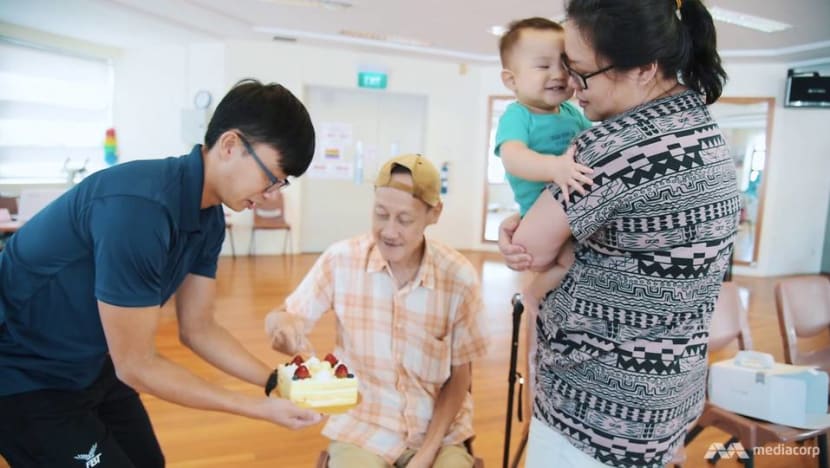Defying frailty: How a 67-year-old is training to walk again
He'd dreamed of travelling. Retiree Jack Liew never thought that instead, he'd be confined to a mobility scooter for two years, fighting pain and the fear of being bedridden. Then came the chance to change his fate.
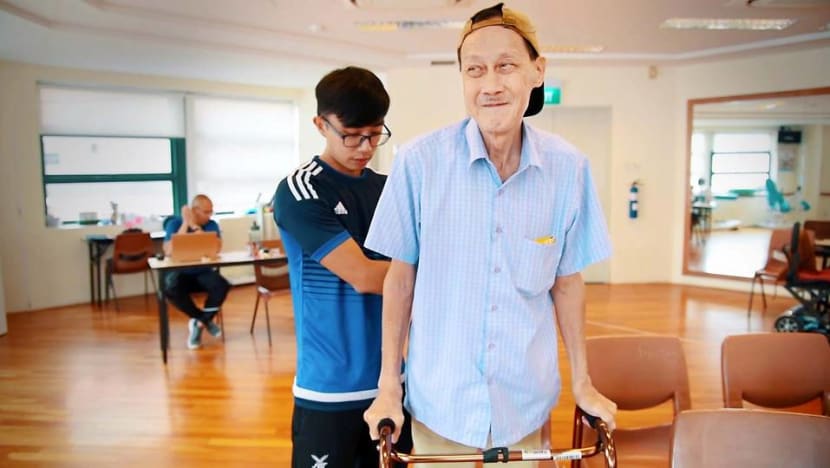
SINGAPORE: It began with a knee replacement operation in 2012. Then another, two years later. The third blow came in 2016: Spinal surgery.
His legs, which once used to carry him long distances on the football pitch in his favourite position as a midfielder, became spindly, and walking became painful. So 67-year-old Jack Liew turned to a personal mobility device to get about.
He would still go to the library almost daily, and return with travel books and documentaries. But they showed him places in the same way as lifting the cover of a birdcage would show its fluttering inhabitant a freedom it cannot have.
Feeling helpless and dependent on his mechanical chair was not how he had imagined his sunset years.
“My idea (of retirement) was that I could travel the world. Now I can’t do it any more,” lamented Mr Liew, who once used to go on walking tours to scenic wonders like the Grand Canyon.
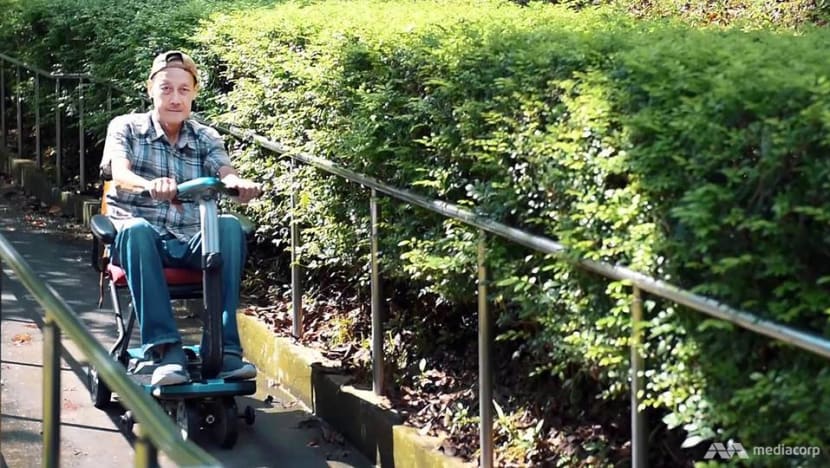
Just a trip outside his home could get him feeling “depressed and lonely”. “Mainly when I see other people doing physical (activities) like running and walking, you know?” he said. “I used to be able to do all these.”
His world felt even lonelier because his wife and son were working, while he had quit his job as a computer engineer owing to his lack of mobility. Afternoons were spent waiting for them to return home.
Yet despite slowly slipping into isolation, Mr Liew refused to accept the notion that old age was an inevitable process of decay.
In the two years since doctors told him that he may never be able to walk normally again, he had not lost hope of getting back on his feet. He just needed to find a way to do it.
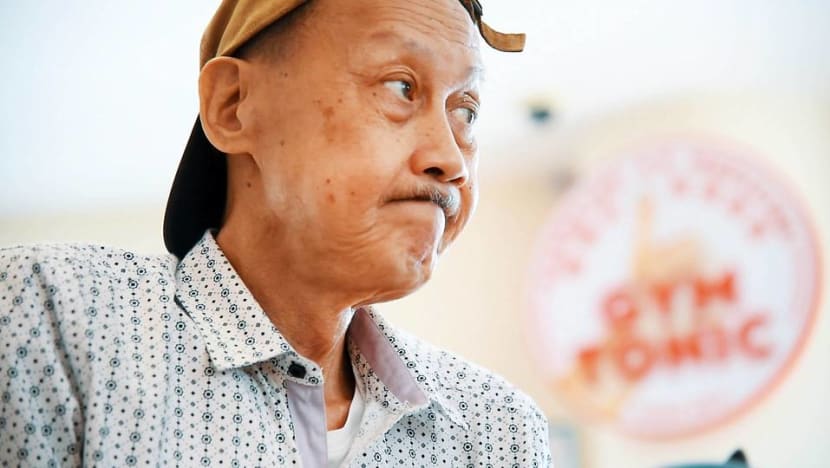
FIGHTING FRAILTY IN OLD AGE
Mr Liew’s situation highlights a growing concern about frailty in Singapore’s ageing population.
It worries caregivers like Ms M L Tan, whose mother S Y Chin, 83, suffered a fall two years ago, about the same time she was diagnosed with dementia. “When you look at your parents (last time), they were independent. But after one or two falls, things change suddenly,” said Ms Tan.
Mdm Chin's physiotherapy sessions lasted for about a year. But afterwards, she became susceptible to falls again. Concerned that she would deteriorate further, her daughter sought other options.
Similarly, Mr Liew, who was using a walking frame at home, recently began feeling a sense of desperation about his physical decline, he shared.
I was fearful that one day I’ll be bedridden. That’s my innermost fear.
Then one day, he saw an advertisement for Gym Tonic, a programme started in 2015 by the Lien Foundation that is focused on helping folks aged 55 or older to regain their physical strength - and in doing so, to extend their independence and functional years.
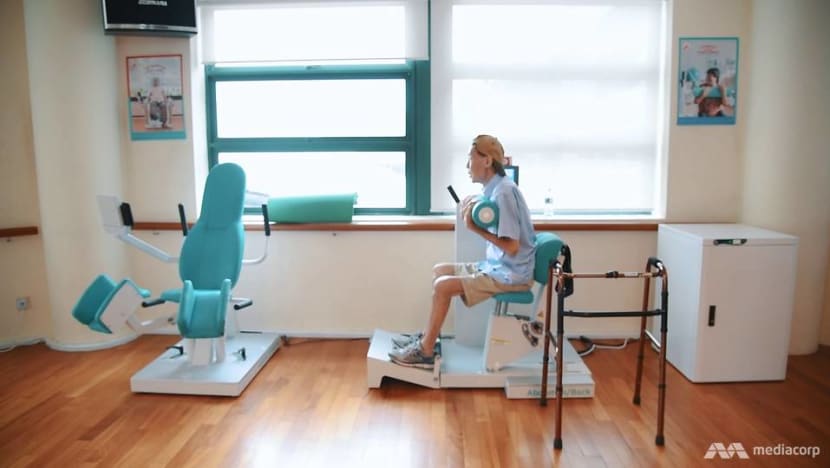
The foundation’s programme director Gabriel Lim said: “With Gym Tonic, we’re trying to address the problem of frailty in the community (and) muscle loss that is typical of ageing.” It is available to seniors at more than 20 eldercare facilities across Singapore.
Participants are assessed before they embark on a three-month fitness journey with a coach, and they must set themselves a goal to achieve at the final assessment. In this way, the training is tailored to his or her own needs.
Mr Liew was “very excited” when he registered for the programme. He knew what his goal would be: To walk again, with just a cane.
NO MIRACLE CURE, BUT STILL A TONIC
The goals are not so dramatic for many of Gym Tonic’s seniors. But improvements can be seen in the little things in their daily life.
One participant, 72-year-old ex-nanny Lim Moi Eng, enrolled in the programme complaining of back pains and having to use heat patches “to soothe the area”.
Since then, with the help of the exercise machines, she has improved her back strength. “Now I don’t need the heat patches,” she said with a laugh.
There is, however, no miracle cure.
“We don’t claim that their leg pain or shoulder pain will get better. We tell them that by doing this, they’ll become stronger,” Gym Tonic wellness coach Looi Yuan Hui said. And if they experience excessive pain, “we encourage them to visit a doctor”.
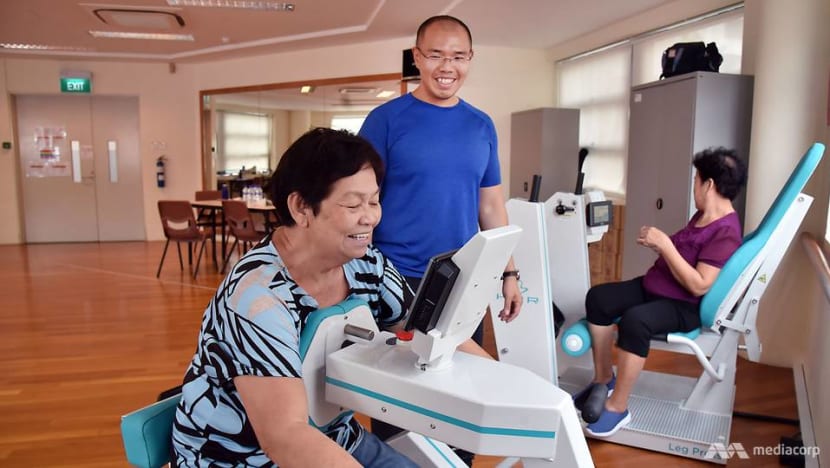
Mr Looi, a former national wrestler who suffered a career-ending knee injury, can empathise with the elderly.
I tend to joke with them, saying that I have one knee that’s 30 years old and another that’s 60 – so I know how it feels when there’s a knee pain.
“They’ve probably been through a dark period in their lives. They just need people to cheer them up at times.”
Indeed, Mdm Chin's daughter observed that her mother has become more mentally alert since joining Gym Tonic. “You can see it in her eyes,” Ms Tan said, adding that she even seems to enjoy the banter with her wellness coaches.
As for Mr Liew, daughter Shawna described him as having been "quite down ever since his surgery", and felt that having a goal to work towards would be good for him.
But she was privately doubtful he could go back to his old "go anywhere he wanted" mobile lifestyle. “It doesn’t look as if he’s going to get there,” she sighed.
“I don’t want to discourage him. But at the same time, you don’t want to over-expect.”
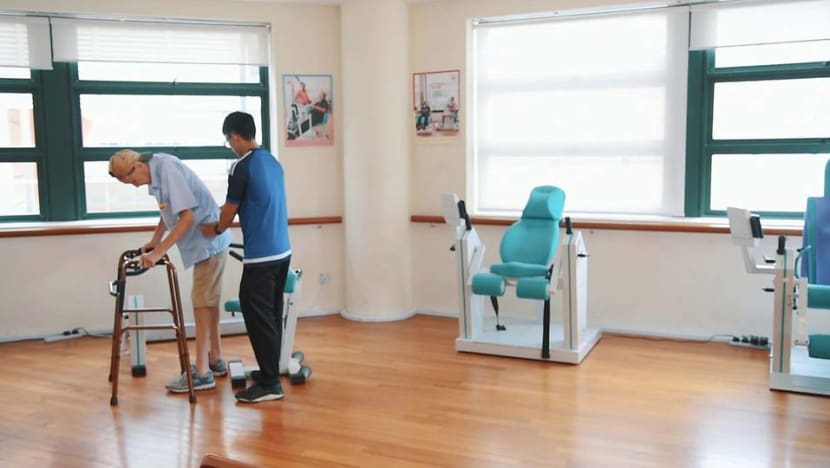
SLOW AND STEADY PROGRESS
Mr Liew’s knees had been giving him trouble long before his surgeries. The same goes for his back, which he sprained carrying heavy computer equipment as a young technician.
But he did not seek medical attention until it was too late. “That’s one thing I didn’t do,” he said, rubbing his scarred and knobbly knees. It is one of his main regrets.
After he started going to his twice-weekly Gym Tonic classes at Bishan Community Club in April, the leg press machine soon became his professed nemesis.
When CNA Insider visited him four weeks into his training, he was pushing a 12.5-kilogramme load on the machine – 1.5 kg heavier than the first time he tried it. He focused with the effort. “This is the real thing,” he said in between breaths.
WATCH: His 12-week journey of ups and downs (12:29)
He made his way diligently from machine to machine, rejecting advice from his wellness coach Joseph Chan to take breaks. There was a glint of determination in his eyes, as he cleared his mind of everything but the task in front of him.
“I just concentrate on myself and my breathing,” Mr Liew said.
This hard work paid off in week nine, when he was able to stand unassisted for 45 seconds, with his legs hip-width apart - surprising even his coach.
“Previously you weren’t able to stand for even one second, right Jack?” Mr Chan, 30, said encouragingly.
THE SETBACK
It was not all plain sailing for Mr Liew, however.
In the 10th week, just two weeks shy of achieving his goal, he lost his balance while getting out of bed and sprained his ankle. Such falls in the past had been like body blows to his will to walk again, and this time was no different.
“My first thought was, ‘oh no, I did it again',” he said, visibly downcast in a vlog he kept for CNA Insider.
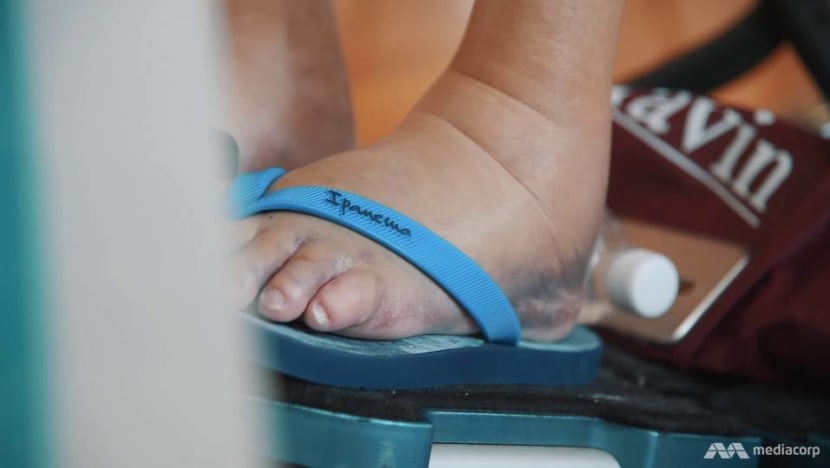
His injury meant he had to lay off the leg press machine and focus more on working out his upper limbs. Mr Chan said such setbacks were "common for the elderly", and sometimes, this might cause a client to quit the programme entirely.
Or, as in Mr Liew's case, put a dent in their optimism. He wasn't his usual self as he moved at a snail’s pace, head bowed, gaze fixed on the black-and-blue sole of his swollen left foot.
“I think I have to resign myself to fate,” a dispirited Mr Liew said haltingly. "I don’t think I can ever walk normally again… (but) I’m still trying.”
REUNITED, AND IT FEELS SO GOOD
In the past, Mr Liew could rouse himself from the dark moments through music. He'd gigged with various bands since he was 14, and played in places like Clarke Quay and Chijmes.
Some of his happiest memories were of playing the bass guitar with his band Criteria, formed in the 1990s by members he had met during a Yamaha music course he was taking.
“Music is my first love,” he said. “Playing in a band … you’d keep your mind off whatever you’re depressed with – at least you feel happy.”
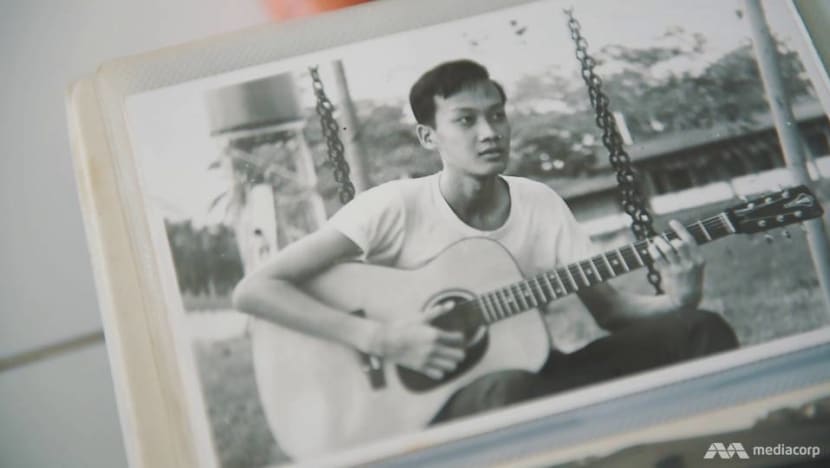
But his hands that could pluck a guitar effortlessly had become gnarled, unable to play riffs as before.
He found some consolation in playing the harmonica and the ukulele as a solo act at home. Since he'd become reliant on his personal mobility device, he'd missed jamming with his band - yet another “depressing part” of his life, he said.
Which is why, to lift his spirits after his recent setback, CNA Insider arranged for Criteria to reunite for a jam session at a studio.
And he did seem to forget about his swollen foot as he whipped out a bass ukulele he had bought online recently. “It’s easier to pluck. I can still play with this,” Mr Liew told his bandmates, tuning it excitedly.
As they launched into several numbers, starting with 60s pop classics from The Beatles and Ben E King. he struggled to keep up. But his enthusiasm did not waver. “Let’s do another one,” he said after every song.

He was especially happy to play Stand By Me, his favourite song. “Because of the lyrics,” he explained. “We’re always a band, and a band always stand by each other.”
The band have decided to get back to jamming together regularly soon.
BABY STEPS
More than just a happy blast from the past, the session helped put Mr Liew in a forward-looking frame of mind again. “Even if you have a disability, try and live your life,” he said.
It was this positivity that he summoned for D-day at Gym Tonic on July 7 – when he had to try walking with a cane.
His coach had postponed the assessment for two weeks to give his ankle time to recover. Giving him an added boost was the presence of his daughter and grandson Linus.
Starting with questions about how active he'd been for example, the assessment proceeded to a series of muscle tests and a balancing test. Then came the moment everyone was waiting for.
As he took up his position with his cane, Mr Chan instructed him: “Stand up tall for me first.”
Taking a deep breath, Mr Liew began to take his first steps, as his coach held his other hand and clutched him from the back for support.
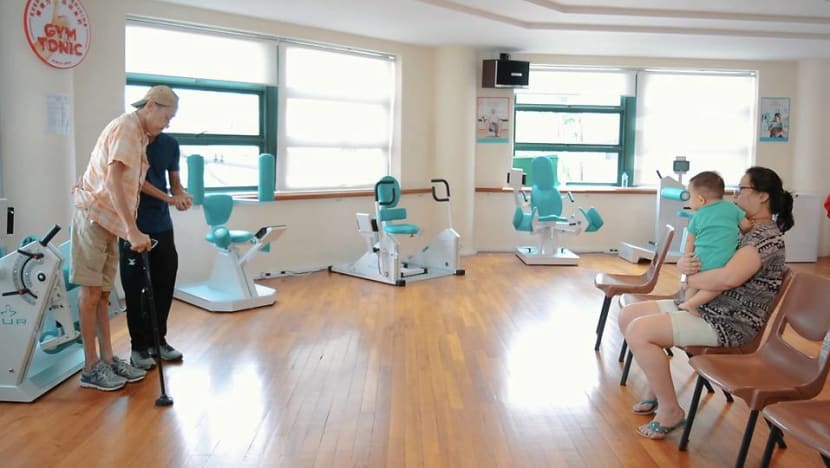
Brow furrowed, he moved slowly for a few metres – and for 27 seconds – before sitting down to catch his breath. His face relaxed, and then he smiled.
“Wow! That’s the first time (in two years) I’ve walked with a cane,” he said.
Happy and surprised at the “vast improvement” she saw, his daughter hoped he would continue to persevere. Mr Chan urged him likewise - though Mr Liew himself seemed to need no prompting.
“It’s a good starting point, but I wouldn’t say I’ve reached my goal yet," said the pleased grandfather, who plans to continue his strength training for another three months. "There are good signs that I can get better."
“Who knows, maybe I’ll be walking (with a cane) the next time you see me.”
